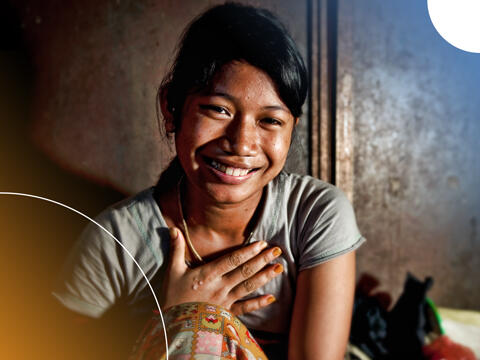"We don't want any more pregnant girls"
Statement by Harold Robinson, Director of the Regional Office of the United Nations Population Fund (UNFPA) for Latin America and the Caribbean.
Motherhood is a cause for celebration and fulfillment for many women. However, there is a time to be a mother. Adolescence is not the right time. Maternity in adolescence, in most cases brings negative and irreversible consequences; The entire life project of the adolescent changes, her economic dependence increases and her educational and work prospects evaporate.
The Latin American and Caribbean region ranks second in terms of adolescent motherhood with 62 births for every 1,000 adolescent girls between 15 and 19 years of age and who generally live in poverty and with limited access to basic social services.
Not surprisingly, the situation has been exacerbated by the disruption of sexual and reproductive health services caused by the COVID-19 pandemic. In many countries, health centers closed and the availability of financial resources for the execution of sexual and reproductive health programs for adolescents and young people was restricted.
For many, the situation is worrying, not only because of the immediate consequences that this brings to girls and adolescents, but also because of the loss of their development opportunities, as well as the high economic costs that early pregnancy has for the State and society. .
The cost of each adolescent pregnancy in Latin America and the Caribbean reached, in 2018 on average, the equivalent of 1,210 dollars per year. This number considers what women stop earning because they work less, because they work in lower-paid jobs and because, by earning less, they also pay less taxes. Multiplied by 1.5 million teenage pregnancies annually, this equates to lost opportunities for young mothers and states in excess of $ 1.8 billion annually.
We acknowledge the efforts that the countries have made in formulating national reproductive health and development plans in Latin America and the Caribbean; however, it is very important to monitor and evaluate them, based on the available evidence. This will allow us to reevaluate the interventions that do not work, including campaigns, and reinforce those that have yielded positive results to effectively reach adolescents living in vulnerable conditions, especially those from poorer, indigenous, and other communities. Afro-descendants and migrants.
It is likely that from these revaluations we can ensure that resources are invested in concrete actions whose effectiveness is proven, and sustainable programs are formulated over time and on a large scale. Additionally, it is important to give priority to the geographical areas and socioeconomic segments with the highest prevalence, as well as to countries that are in fragile situations and humanitarian crises. All of this will create an environment conducive to adolescent girls' sexual and reproductive health and rights.
If these commitments are applied rigorously, it will undoubtedly contribute to the reduction of adolescent pregnancy and provide important support for girls and adolescents to enter adult life as empowered citizens, aware of their rights and with better opportunities to develop their full potential.
Today is observed at the regional level "Teen Pregnancy Prevention Week", which aims to avoid the consequences of unplanned pregnancy in this age group. In this effort, the United Nations Population Fund makes an urgent call for the governments of the region to apply strategies and immediate measures focused on reducing adolescent pregnancy.
We face the challenge of addressing one of the most severe crises that we have ever experienced, but also the great opportunity to find new paths of human and economic development. The call is not to stand still and not leave anyone behind. We all - authorities, regional partners, civil society, the private, social, educational and health sector, communities and parents - must urgently join in accelerating progress in reducing adolescent pregnancy. Our girls and adolescents need us to support them and offer them real opportunities. She, like everyone else, deserves to enjoy the full exercise of her fundamental rights and freedoms.


